- Home
- Bonnie Bryant
Purebred Page 7
Purebred Read online
Page 7
Carole was beginning to feel pretty upset herself. “I don’t know what’s going on,” she said. “Jessie said she was going to ride out to Lover’s Point and I told her she shouldn’t. I told her she might have screwed things up in her life before, but she shouldn’t do it again—she shouldn’t endanger Kismet like that. Jessie ran off and now Louise is mad and went off to be with Jessie. I don’t know what’s wrong with either of them.”
Grand Alice looked very grave. “Oh, dear,” she said slowly. “Oh, dear, you shouldn’t have said that.” She looked very unhappy.
“Said what?” Carole asked. She had a sudden feeling that she’d done something very wrong.
“Said that to Jessie. The very wrong thing to say,” Grand Alice said. “You didn’t know. How could you? But oh, dear, you shouldn’t have.”
“What is it?” she asked. “What did I say?”
“Let’s go find a quiet place to talk,” Grand Alice said grimly. She got up from her chair. “You’ll need to hear the whole story now.”
She led Carole into a small side room and closed the door. She sat down, and Carole sat down to listen.
“FIFTEEN YEARS AGO,” Grand Alice began, “when Jessie was barely out of high school, she met a man named Lawrence Freeman. He was an artist. He liked her photographs. She liked his paintings. He was tall and funny and as much in love with her as she was in love with him. I never saw anyone love someone so much as Jessie loved Lawrence Freeman.
“They got married and moved to New York City. He painted and taught art at Hunter College, and Jessie took photographs full-time. They did well—they had a few art exhibitions and started selling some of their work, and they really enjoyed living in the city. They were as happy as they could be—even more so when, after two years, Jessie had a baby girl. They named their daughter Joy.”
“That was the man and child in the photograph,” Carole said.
Grand Alice nodded. “That’s right.”
If they were so happy, Carole thought, then why would Jessie leave? Why would she come back to Minnesota? She wanted to ask Grand Alice, but she made herself sit still and listen.
Grand Alice continued, “One fall weekend, they decided to take a short vacation. They rented a car and drove to the Berkshire hills in western Massachusetts to look at the fall foliage. The hills in New England are beautiful that time of year. They were driving down Route Nine, near Holyoke, when something went wrong. To this day we’re not sure exactly what happened. Maybe something was spilled on the highway. Maybe something was wrong with the car. Anyhow, it skidded without warning, flipped over the guard rail, and tumbled down the embankment. Jessie was hardly hurt at all.”
Carole shut her eyes. She was suddenly afraid that she knew what Grand Alice was going to say next.
“Lawrence and Joy were killed.”
Grand Alice paused as if to compose herself. Carole didn’t know what to say. Poor Aunt Jessie! She felt terrible, both for her aunt and about herself. Here she’d thought that Jessie had abandoned her family, and instead they’d been tragically killed. Carole knew that she shouldn’t make assumptions about other people. From now on, she promised herself, she would remember not to.
She reached out and held Grand Alice’s hand. Grand Alice gave her a sad smile.
“Unfortunately, Jessie had been driving,” Grand Alice went on. “No one blamed her for what happened—there were witnesses who saw the accident, and said that the car went completely out of control—but Jessie blamed herself. She still can’t forgive herself. Now it seems like the only time she’s ever happy is when she’s taking photographs. It’s the only time that she can completely forget about her family.” Grand Alice shook her head. “We never talk about Lawrence and Joy, or New York, because it’s easier for Jessie not to remember them.”
Carole frowned. “But that doesn’t make sense,” she argued. “I don’t understand that kind of attitude. My mom died—”
“I know, dear. I loved your momma. I don’t forget her.”
“But that’s exactly what I mean,” Carole insisted. “I would never want to forget her. In fact, my dad and I talk about her all the time. We talk about the things we used to do together, and we talk about what Mom would think or say if she were still alive. If she knew I had a horse, for instance. I need to talk about her. I never want to forget a single thing about her.”
Grand Alice laid her hand against Carole’s cheek, and Carole leaned against it for a moment. “You must understand that everyone grieves differently,” she said gently. “Do you remember your mother’s funeral—how some people were crying, and some were not?”
“Yes.” Carole did remember.
“And you and your father, you weren’t always sad the same amount at the same times, were you?” Carole shook her head. “People all mourn differently, Carole. They all deal with pain in different ways. Personally, I like your way better than Jessie’s. I’ve lost a lot of loved ones in my life, and if I tried to forget them all I wouldn’t have much memory left. But your case is different from Jessie’s—you don’t blame yourself for your mother’s death. You don’t feel guilty. And even if the circumstances were the same—well, people are different, that’s all. You need to respect Jessie’s right to forget just as she needs to respect your right to remember.”
Carole thought that she understood. “I’ll try,” she said. “I guess I still don’t really understand Jessie, but maybe I don’t have to. I guess I shouldn’t have said what I did, either. I think I’d better apologize.”
“I think that’s a good idea,” Grand Alice said with a nod of her head. “You’re a compassionate person, Carole. Be kind to Jessie. Her life has not been easy.”
“Miss Alice?” Colonel Hanson knocked, then opened the door. “I came to see if you would favor me with a dance.” He looked from Carole to Grand Alice and back again. “Or am I interrupting?”
“Carole and I just came in here for a quiet chat,” Grand Alice said. “I think we’re finished now.”
“We were talking about Aunt Jessie,” Carole said. “Grand Alice told me about Lawrence and Joy.”
Colonel Hanson nodded slowly. “So now you know,” he said. “Lawrence was a good man, Carole, and you would have liked him as an uncle. You and Joy might have been good friends.” He sighed and ran his fingers through his hair. “I didn’t like not telling you about them, Carole, but Jessie keeps that part of her life so private.… I thought you ought to hear it from this side of the family.”
Carole nodded. After what Grand Alice had told her, she understood why her father had kept the secret.
“She knows now,” Grand Alice said. “She’s old enough to understand. And I’d be pleased to dance with you, grandson, only none of that fast stuff, do you hear me? When you get to my age, you move slow.” She lifted her chin regally and held her hand up to Colonel Hanson with the grace of a queen. He laughed and helped her to her feet.
“A fox trot is all,” he promised, leading her to the dance floor.
Carole leaned against the door frame and watched them. Christina’s father’s “lousy jazz” was back on the stereo, and her father and Grand Alice moved gently to its slow, soft beat.
She thought again about the story Grand Alice had told her. She’d been so caught up in the idea of family history and bloodlines that she’d been overly ready—even eager—to believe that Jessie had behaved like Jackson Foley. That hadn’t been the case at all Jessie’s anger and grief were nothing like Jackson’s abandonment and betrayal Clearly, Jessie was not much like Jackson. Maybe bloodlines weren’t as important in humans as they were in horses.
Carole thought back—if Jessie had married Lawrence fifteen years ago, then Joy, if she had lived, would have been close to Carole’s age. She would have been close to Louise’s age too.
Suddenly Carole felt she had found a key to understanding the close, protective relationship between Jessie and Louise. Once when Carole had gone on rounds with Judy Barker, Pine Hollow’s veterinarian,
she had seen a mare whose foal had died at birth. The mare seemed lost and unhappy without a foal to care for, but over the next several weeks she had gradually “adopted” another foal, as a way to soothe her grief. She had licked and fussed over and even nursed her adoptive baby, and the foal, cared for by two attentive mothers, had thrived.
Jessie and Louise reminded Carole of that mare and foal. Who was Carole to say that they hadn’t both benefited by being so close to each other? For a brief moment Carole envied Louise. If Jessie had been nearby when Carole’s mother had died, perhaps they could have leaned on each other. Carole would have liked that.
The music ended, and the silence broke Carole out of her reverie. Her father and Grand Alice stopped dancing and Grand Alice took a seat at the edge of the dance floor. Colonel Hanson went into the kitchen and came back with something to drink for both of them. That was a good idea—Carole was thirsty too. Plus, Jessie and Louise had gone into the kitchen. Carole would get a soda and apologize to Jessie at the same time.
But the big room was empty except for two little kids racing toy cars across the tiled floor. Carole looked back into the party rooms, but she didn’t see Jessie or Louise—or Christina either—there. She did see Emile, sitting by himself on the sofa. He waved to her, and she was just about to go ask him where everyone was when Christina came through the lean-to door.
A blast of icy air came in with her. Christina was heavily dressed in a thick parka and boots, with a scarf wrapped around and around her face. “Brrr! It’s really getting cold out there!” she said to Carole through folds of scarf.
Carole helped her unwrap.
Christina’s cold fingers fumbled with her parka zipper. “I’m half numb.” She took off her hat and shook out her hair.
“Have you seen Louise?” Carole asked.
“Sure. That’s where I’ve been. I just gave her a ride home on my snowmobile.” Christina set her dripping snow boots on the mat by the door and hung up her coat on a hook. “She said she wasn’t feeling well, but her parents are having fun and she didn’t want to make them leave the party.”
That didn’t sound right to Carole. Louise had been feeling fine all day long. But why would she lie to Christina? Carole had a sudden bad feeling. “What about my aunt Jessie?” she asked. “Have you seen her?”
“Uh-uh.” Christina shook her head. “I think she’s gone, too, because her truck isn’t in the driveway. Didn’t she come over separately from the rest of you?”
“Yes.” So Jessie was gone, and now Louise too. Carole still didn’t believe that Jessie would ride out to Lover’s Point, but clearly she had at least gone home. Gone home to sulk, Carole thought. No, that wasn’t right—gone home because Carole had upset her. Carole felt like she had spoiled the party for both Jessie and Louise. In the back of her mind, she considered how disastrous it might be if Jessie actually did go to Lover’s Point—but the front of her mind wouldn’t let that be a possibility. Still, she felt responsible. She should do something. She would go home and persuade them both to come back to the party.
“Can I borrow your snowmobile?” she asked Christina. “I’d like to go home and check on Louise.”
Christina frowned. “Gee, Carole, do you think that’s really necessary? It’s awfully cold out there, and I don’t think Louise is very sick. She said she just had a bad headache. Stay here—you’ll have fun with me and Emile.”
“I know I would, but I’d rather be sure Louise is okay,” Carole said. “I don’t want to bother Aunt Lily and Uncle John either—Louise was right, they are having fun. But I’d really like to go.” Carole smiled; she hoped persuasively. She didn’t want to let Christina know how worried she felt.
Christina looked out the window and shivered. “It’s just that I don’t think I should let you go alone.” She looked at Carole doubtfully.
“Oh, come on,” said Carole. “There’s no reason for you to get cold all over again. I’ll wrap up and be careful, and besides, you know I can drive your snowmobile. It’s not like I have to drive it on roads or anything—it’s a straight shot home through the woods. I can follow the tracks you just made. They’ll be easy to see in the bright moonlight.”
“Well …” Christina looked into the living room. Emile waved and beckoned to her.
“Please,” Carole said. “I’ll come right back. You’ve already spent plenty of time away from Emile. I’ll be careful, I promise.”
“Okay. But do be careful.” Christina handed Carole the snowmobile keys, and Carole ran upstairs to get her coat. She put it on quickly. She hoped everything would be all right.
THE WOODS FELT dangerous at night. The trees cast dark and terrible shadows under the full moon’s bright light, and the heavy blanket of snow made stumps and fallen trees look menacingly large.
Carole, following the trail Christina had made, found herself becoming more and more frightened. She told herself firmly not to be scared. She reminded herself of how beautiful the trees were by daylight—how peaceful, how serene. She told herself that she had been in forests before: she had camped out many times; she had even ridden down a mountain trail in the dark. But then something swooped past her with a terrible screech and she felt panic rising in her throat. She tried not to scream.
She hit the throttle hard and the snowmobile shot ahead. It was difficult to control on the uneven ground; it shook and rocked as it hit things she couldn’t see. She was afraid to go too fast because she might hit something and wreck the snowmobile, but she was afraid to go too slowly because she wanted to get out of the woods as fast as she could.
She began to have a hard time following Christina’s tracks—she couldn’t see them very clearly—and looking up, she saw a huge bank of clouds sweeping in from the northwest to cover the bright moon. The clouds were moving fast. The wind was blowing hard, and Carole had never been so cold. Her stomach muscles tightened into a ball. Her teeth were clenched too hard to chatter. Already her fingers and feet were growing numb.
The woods grew darker. Whump! The snowmobile hit a fallen tree, careened off the top, and nearly overturned. Carole fought for her balance. It was worse than being on a bucking horse. At least a horse had some sense. The snowmobile did not. She gathered her courage around her and kept going.
The compound couldn’t be too much farther ahead. She felt as if she’d been traveling for hours. She pushed the snowmobile as fast as she dared, faster and faster as the woods began to thin, and finally she saw lights ahead. A wave of relief washed over her.
The snowmobile began to slow down. Carole pushed the throttle harder, but the snowmobile sputtered and choked to a stop. Carole felt another flash of panic—had she broken it?—before she saw that the needle of the gas gauge pointed firmly to E. Empty. Out of gas.
Reluctantly she left the snowmobile in a snowdrift and struggled the rest of the way to the house on foot. A snowflake fell, and then another. She put up a mittened hand to catch them. Snow. This was what the dark clouds meant. There was going to be a storm.
Inside, the warm air greeted her like a friend. Ginger, Louise’s dog, rushed up to her and began to lick her excitedly. “Down, Ginger,” she murmured automatically. She quickly took off her sopping wet shoes, and shook the snow from her pant legs. “Hello?” she shouted. “Louise? Aunt Jessie?” No one answered. Carole ran through the house, calling their names. No one was there.
Next she tried Jessie’s apartment. The lights were off and the rooms were dark and quiet. Then she tried the photo lab. The lights were on there, but the lab was empty. “They didn’t really go, did they?” she asked Ginger, who was following her from room to room. Ginger wagged his tail. Carole felt almost sick. She looked around at Jessie’s camera equipment, but the lab was too disorderly and Jessie had too many cameras for Carole to tell if anything was gone.
“We’ll check the barn,” she said to Ginger. At the door she pulled on the boots she had borrowed the day before and hurried back into the cold. Snow was falling, lightly but steadily.
The aisle light was burning brightly and the horses looked at her inquiringly. One horse, two—Carole counted them and her heart sank. Jiminy and Kismet were gone. Kismet’s blanket was neatly folded and her stall door was latched shut, but Jiminy’s door hung open and his blanket had been quickly tossed on the ground.
So, Carole thought, Jessie had gone out alone, and Louise had followed her in a hurry. Mechanically she picked up Jiminy’s blanket. It was still warm from the heat of his body. Louise hadn’t been gone long.
They must have gone to Lover’s Point. It occurred to Carole that Aunt Jessie’s recklessness might to some extent be because she really didn’t care what happened to herself. That was okay for Aunt Jessie, maybe—but now her attitude involved not just herself, but Louise, Jiminy, and Kismet too. Something had to be done to stop them before one of them got hurt. Carole knew she was the only one who could do it.
She went back to the house to call for help, dripping snow across the kitchen floor. Frantically she searched the drawers for the phone book. What was Christina’s last name? She thought hard. Johnson! She had to take off her mittens to open the phone book—and then she stared at the page in dismay. Of the hundred or so families listed in the tiny directory, eighteen were named Johnson. She looked in the drawer where she’d found the phone book, then back at the phone. It had a row of autodial buttons—one was labeled “Christina.” She pushed it thankfully, and put the receiver to her ear.
Nothing. Not even a dial tone. She whacked the reset button over and over, and jiggled the cord in its socket, but nothing happened. The phone was dead. Carole remembered Aunt Jessie’s words: “The roads aren’t always passable, and the phones don’t always work.” She couldn’t call Christina’s house. She couldn’t use the snowmobile either.
She thought of the other two horses. They weren’t as fast as the snowmobile, but they were the only alternative she had. She didn’t have time to waste. She would saddle up Spice and go after them herself.

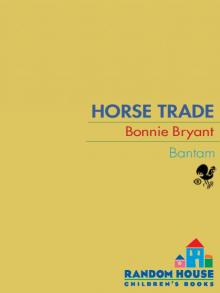 Horse Trade
Horse Trade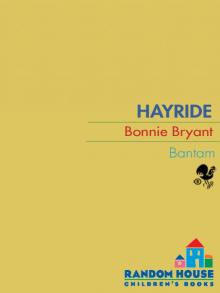 Hayride
Hayride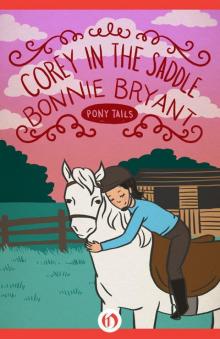 Pony Tails 06- Corey in the Saddle
Pony Tails 06- Corey in the Saddle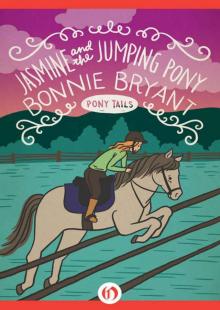 Jasmine and the Jumping Pony (Pony Tails Book 16)
Jasmine and the Jumping Pony (Pony Tails Book 16)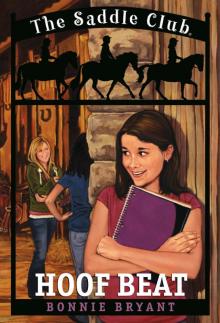 Hoof Beat
Hoof Beat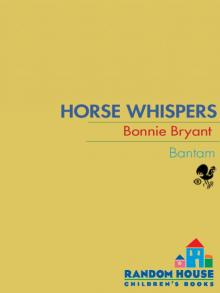 Horse Whispers
Horse Whispers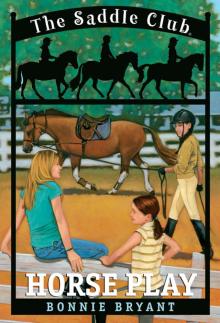 Horse Play
Horse Play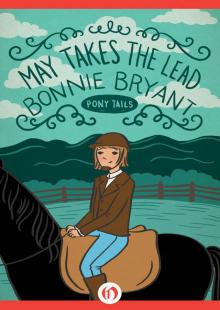 Pony Tails 05- May Takes the Lead
Pony Tails 05- May Takes the Lead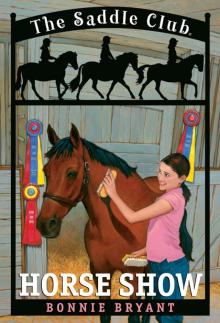 Horse Show
Horse Show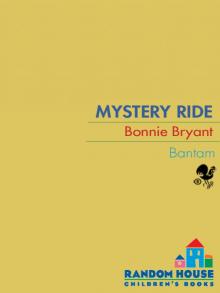 Mystery Ride
Mystery Ride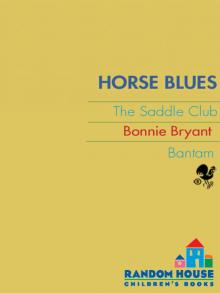 Horse Blues
Horse Blues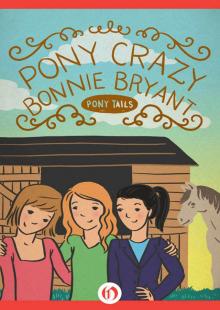 Pony Tails 01- Pony Crazy
Pony Tails 01- Pony Crazy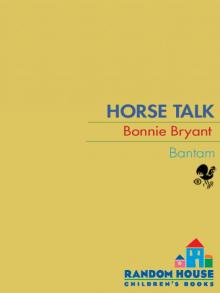 Horse Talk
Horse Talk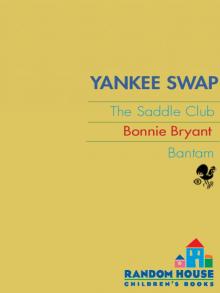 Yankee Swap
Yankee Swap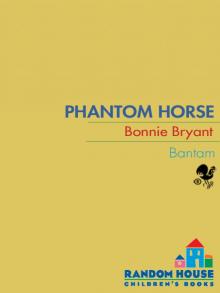 Phantom Horse
Phantom Horse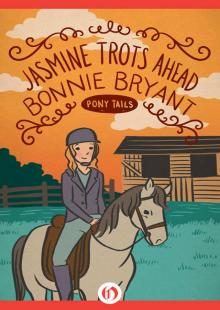 Pony Tails 07- Jasmine Trots Ahead
Pony Tails 07- Jasmine Trots Ahead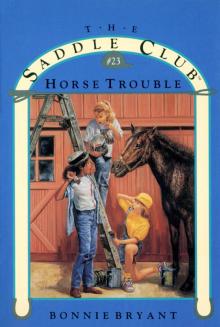 Horse Trouble
Horse Trouble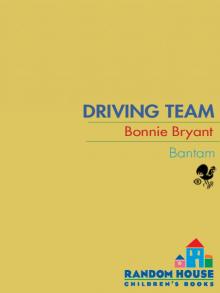 Driving Team
Driving Team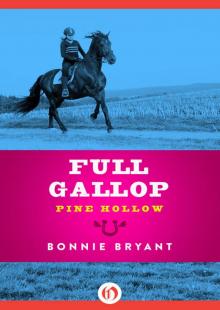 Full Gallop
Full Gallop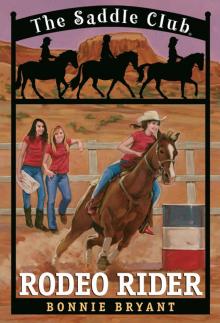 Rodeo Rider
Rodeo Rider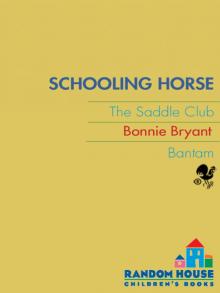 Schooling Horse
Schooling Horse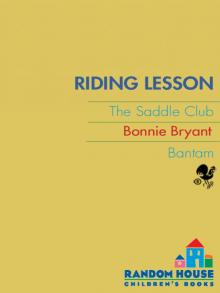 Riding Lesson
Riding Lesson Million-Dollar Horse
Million-Dollar Horse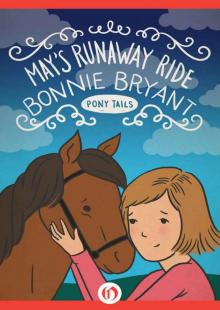 May's Runaway Ride (Pony Tails Book 14)
May's Runaway Ride (Pony Tails Book 14)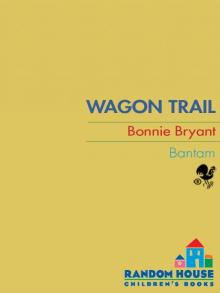 Wagon Trail
Wagon Trail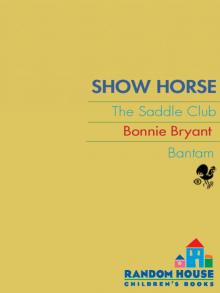 Show Horse
Show Horse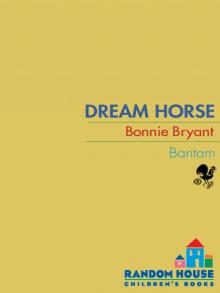 Dream Horse
Dream Horse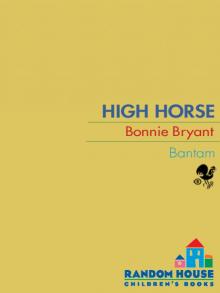 High Horse
High Horse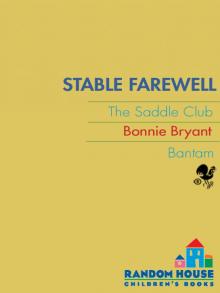 Stable Farewell
Stable Farewell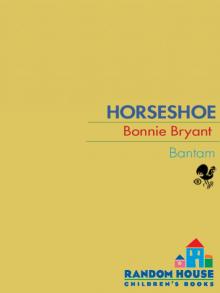 Horseshoe
Horseshoe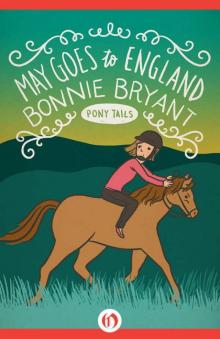 May Goes to England (Pony Tails Book 11)
May Goes to England (Pony Tails Book 11)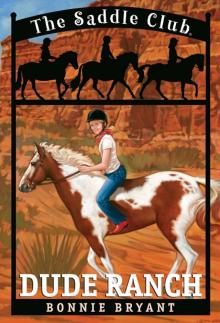 Dude Ranch
Dude Ranch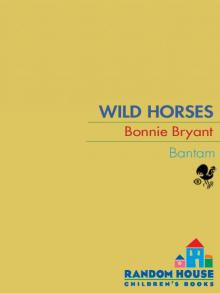 Wild Horse
Wild Horse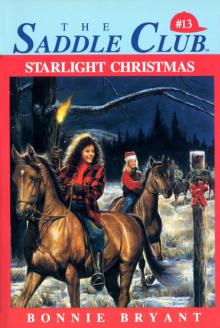 Starlight Christmas
Starlight Christmas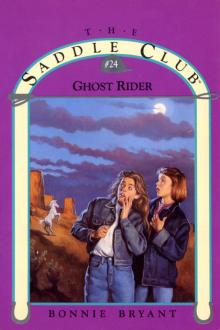 Ghost Rider
Ghost Rider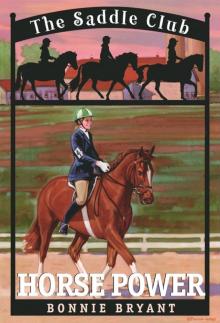 Horse Power
Horse Power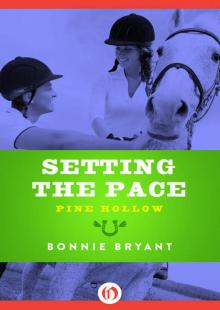 Setting the Pace
Setting the Pace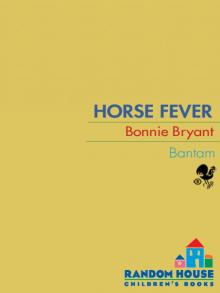 Horse Fever
Horse Fever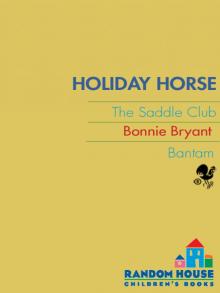 Holiday Horse
Holiday Horse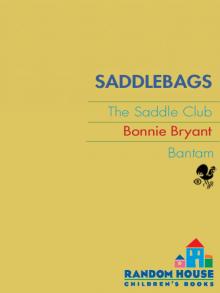 Saddlebags
Saddlebags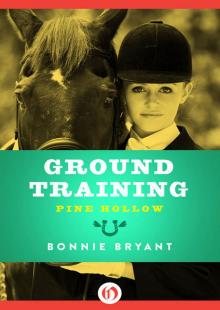 Ground Training
Ground Training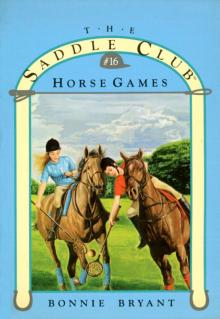 Horse Games
Horse Games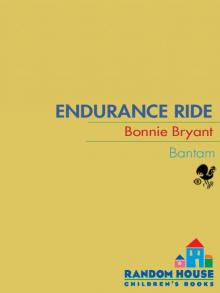 Endurance Ride
Endurance Ride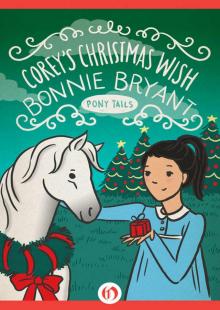 Pony Tails 15- Corey's Christmas Wish
Pony Tails 15- Corey's Christmas Wish Christmas Treasure
Christmas Treasure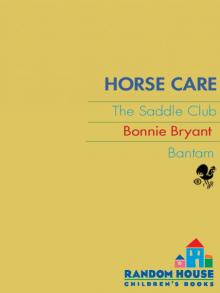 Horse Care
Horse Care Stagecoach
Stagecoach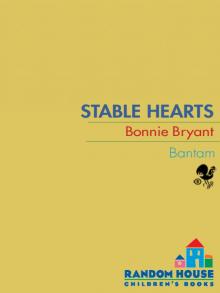 Stable Hearts
Stable Hearts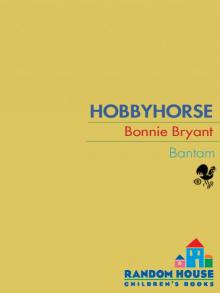 Hobbyhorse
Hobbyhorse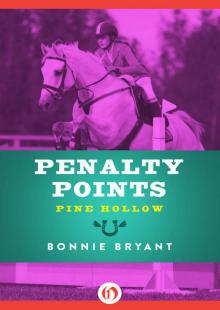 Penalty Points
Penalty Points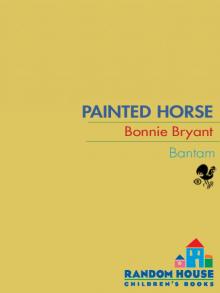 The Painted Horse
The Painted Horse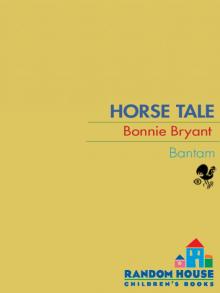 Horse Tale
Horse Tale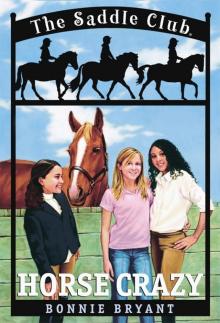 Horse Crazy
Horse Crazy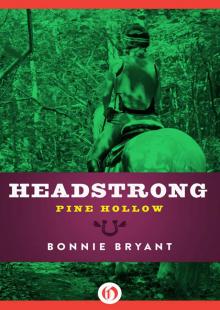 Headstrong
Headstrong English Rider
English Rider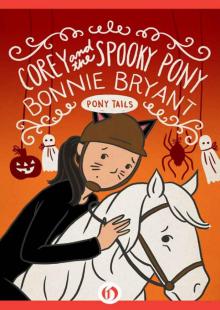 Corey and the Spooky Pony (Pony Tails Book 9)
Corey and the Spooky Pony (Pony Tails Book 9)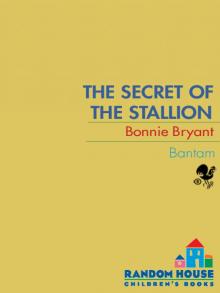 Secret of the Stallion
Secret of the Stallion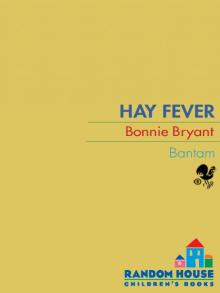 Hay Fever
Hay Fever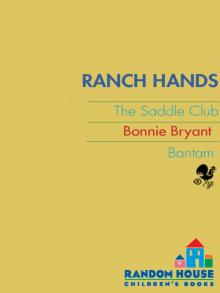 Ranch Hands
Ranch Hands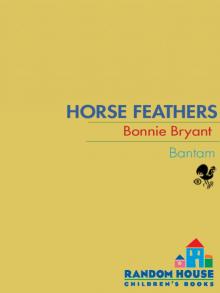 Horse Feathers
Horse Feathers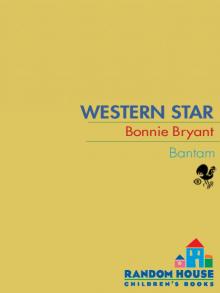 Western Star
Western Star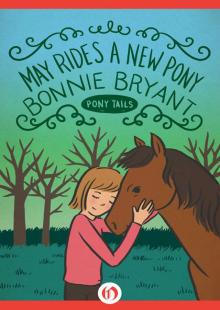 Pony Tails 08- May Rides a New Pony
Pony Tails 08- May Rides a New Pony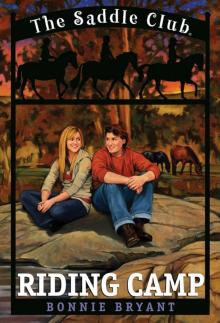 Riding Camp
Riding Camp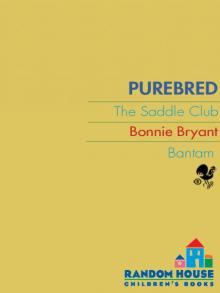 Purebred
Purebred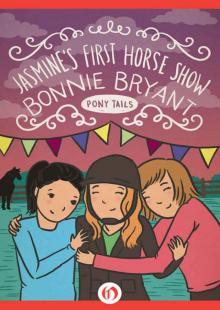 Jasmine's First Horse Show (Pony Tails Book 13)
Jasmine's First Horse Show (Pony Tails Book 13)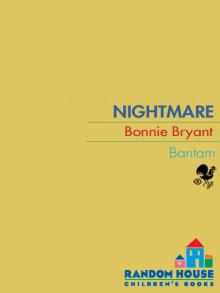 Nightmare
Nightmare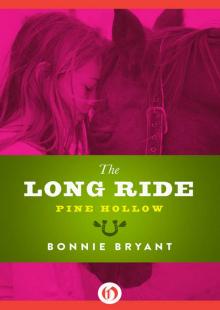 The Long Ride
The Long Ride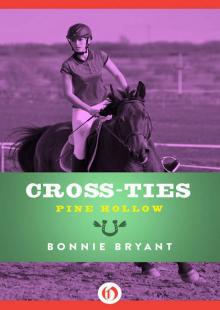 Cross-Ties
Cross-Ties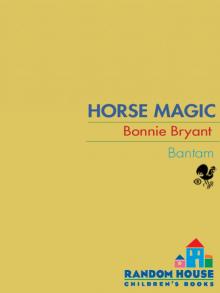 Horse Magic
Horse Magic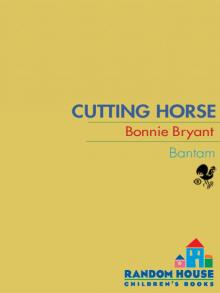 Cutting Horse
Cutting Horse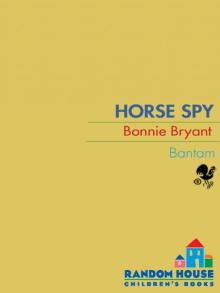 Horse Spy
Horse Spy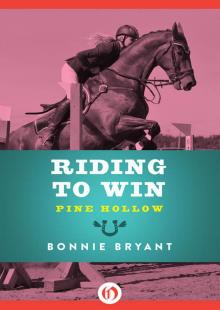 Riding to Win
Riding to Win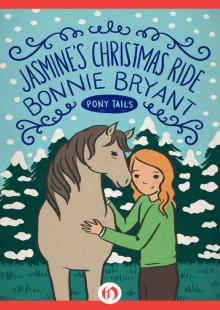 Pony Tails 04- Jasmine's Christmas Ride
Pony Tails 04- Jasmine's Christmas Ride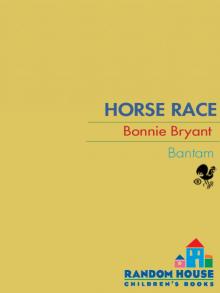 Horse Race
Horse Race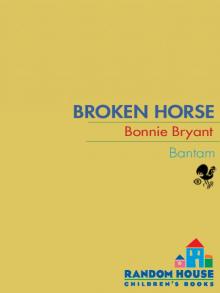 Broken Horse
Broken Horse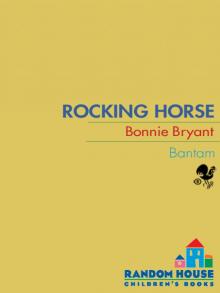 Rocking Horse
Rocking Horse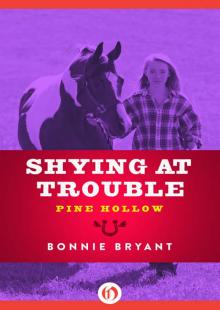 Shying at Trouble
Shying at Trouble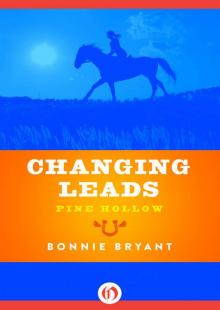 Changing Leads
Changing Leads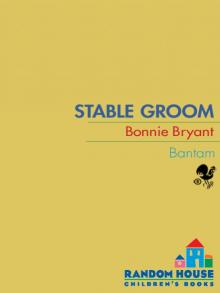 Stable Groom
Stable Groom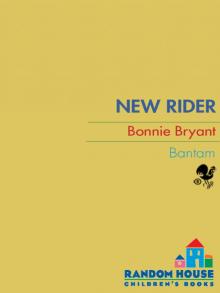 New Rider
New Rider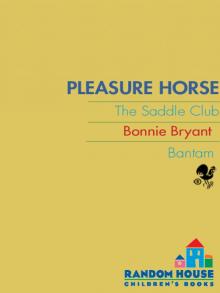 Pleasure Horse
Pleasure Horse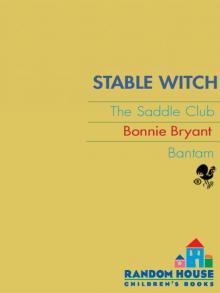 Stable Witch
Stable Witch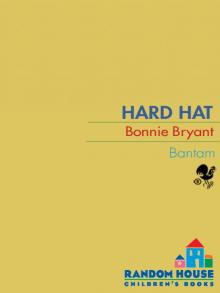 Hard Hat
Hard Hat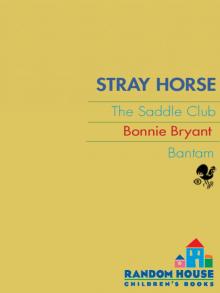 Stray Horse
Stray Horse High Stakes
High Stakes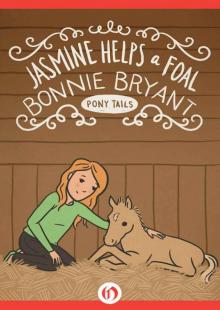 Jasmine Helps a Foal (Pony Tails Book 10)
Jasmine Helps a Foal (Pony Tails Book 10) English Horse
English Horse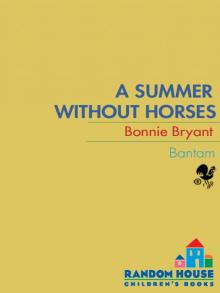 A Summer Without Horses
A Summer Without Horses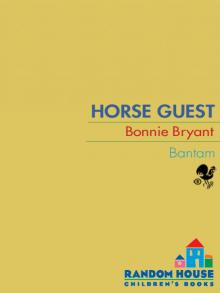 Horse Guest
Horse Guest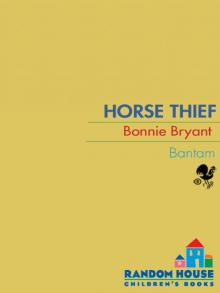 Horse Thief
Horse Thief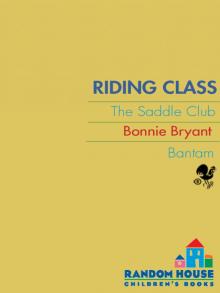 Riding Class
Riding Class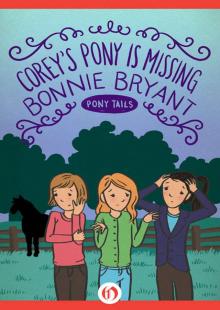 Pony Tails 03- Corey's Pony Is Missing
Pony Tails 03- Corey's Pony Is Missing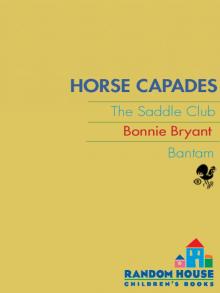 Horse Capades
Horse Capades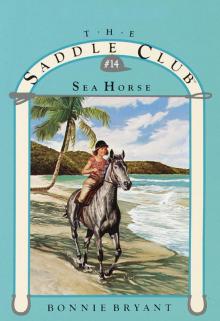 Sea Horse
Sea Horse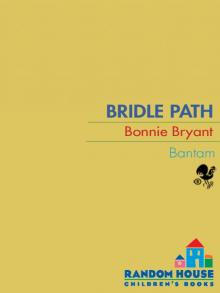 Bridle Path
Bridle Path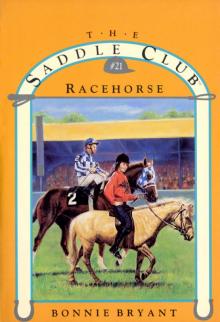 Racehorse
Racehorse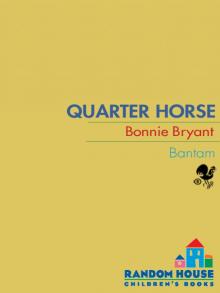 Quarter Horse
Quarter Horse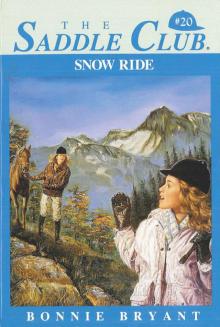 Snow Ride
Snow Ride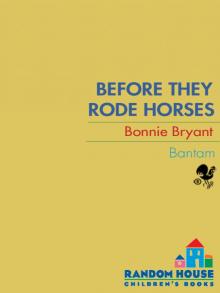 Before They Rode Horses
Before They Rode Horses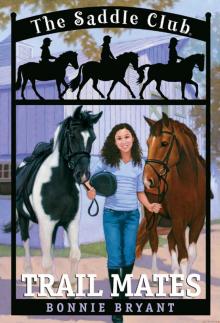 Trail Mates
Trail Mates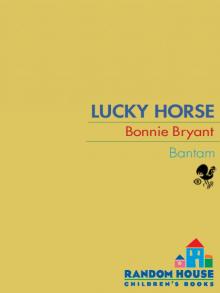 Lucky Horse
Lucky Horse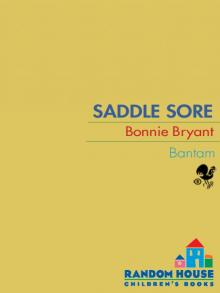 Saddle Sore
Saddle Sore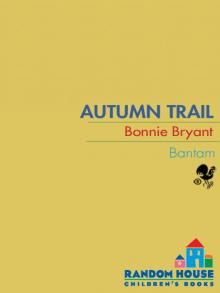 Autumn Trail
Autumn Trail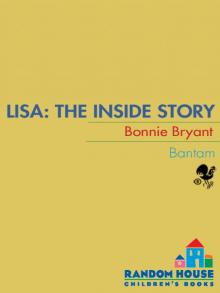 Lisa
Lisa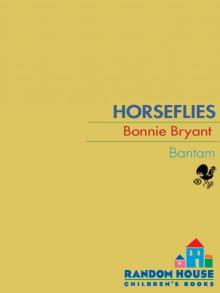 Horseflies
Horseflies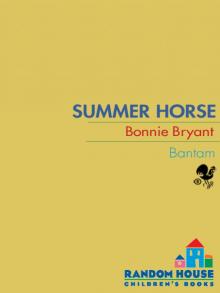 Summer Horse
Summer Horse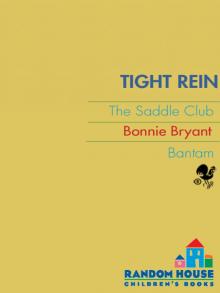 Tight Rein
Tight Rein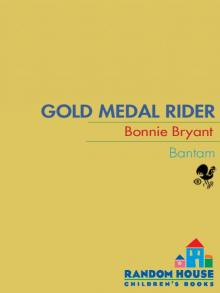 Gold Medal Rider
Gold Medal Rider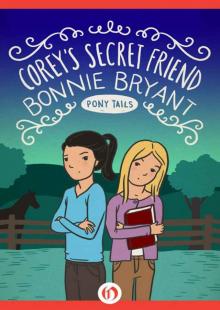 Corey's Secret Friend (Pony Tails Book 12)
Corey's Secret Friend (Pony Tails Book 12)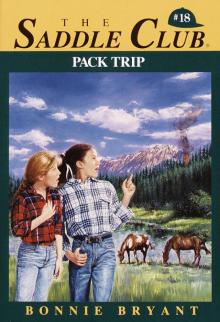 Pack Trip
Pack Trip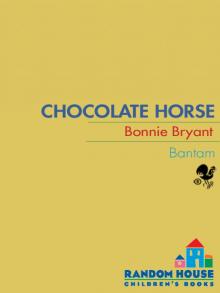 Chocolate Horse
Chocolate Horse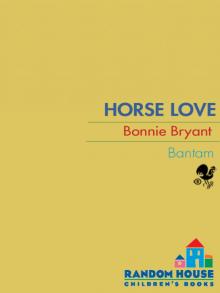 Horse Love
Horse Love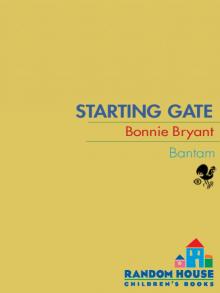 Starting Gate
Starting Gate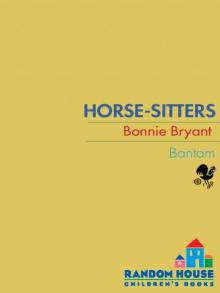 Horse-Sitters
Horse-Sitters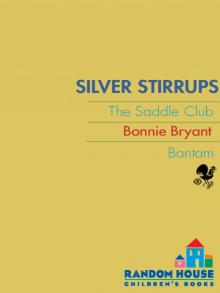 Silver Stirrups
Silver Stirrups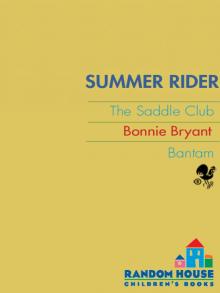 Summer Rider
Summer Rider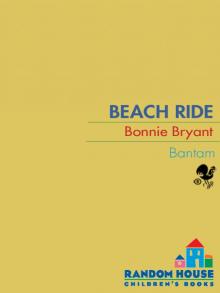 Beach Ride
Beach Ride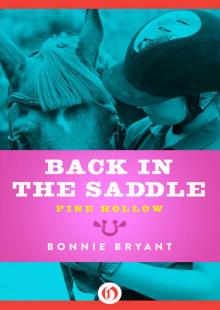 Back in the Saddle
Back in the Saddle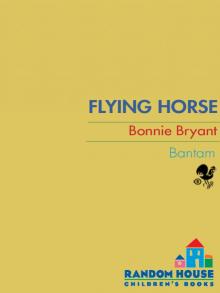 Flying Horse
Flying Horse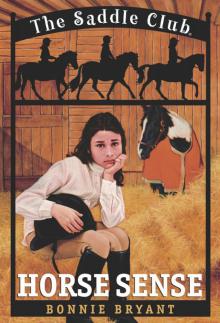 Horse Sense
Horse Sense Photo Finish
Photo Finish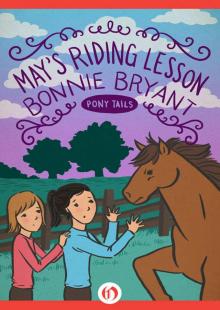 Pony Tails 02- May's Riding Lesson
Pony Tails 02- May's Riding Lesson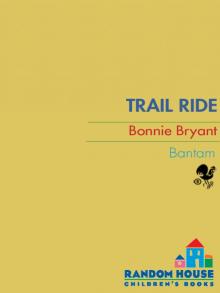 Trail Ride
Trail Ride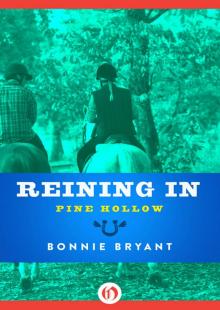 Reining In
Reining In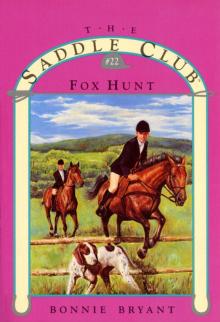 The Fox Hunt
The Fox Hunt Show Judge
Show Judge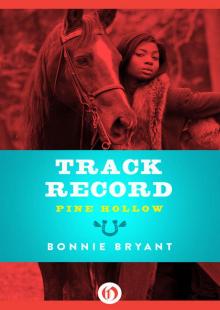 Track Record
Track Record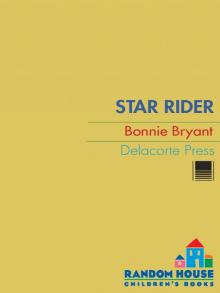 Star Rider
Star Rider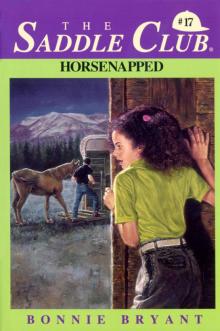 Horsenapped!
Horsenapped!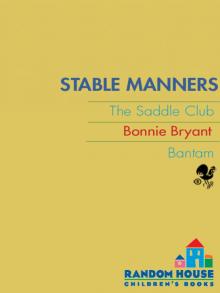 Stable Manners
Stable Manners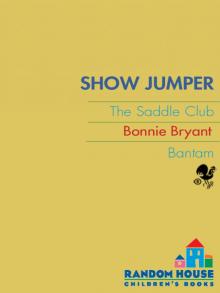 Show Jumper
Show Jumper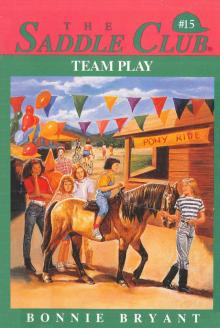 Team Play
Team Play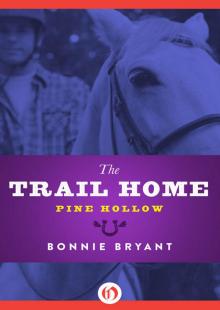 The Trail Home
The Trail Home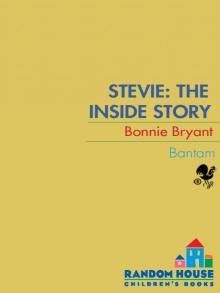 Stevie
Stevie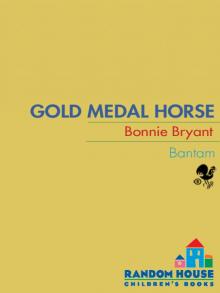 Gold Medal Horse
Gold Medal Horse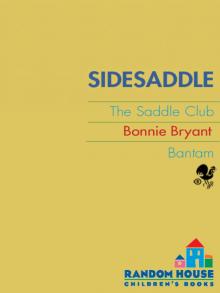 Sidesaddle
Sidesaddle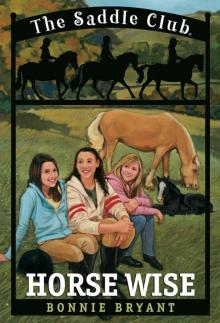 Horse Wise
Horse Wise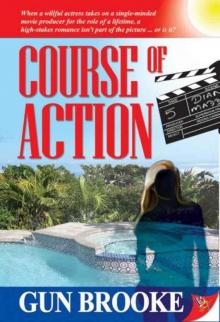 Course of Action
Course of Action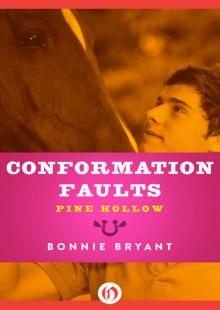 Conformation Faults
Conformation Faults